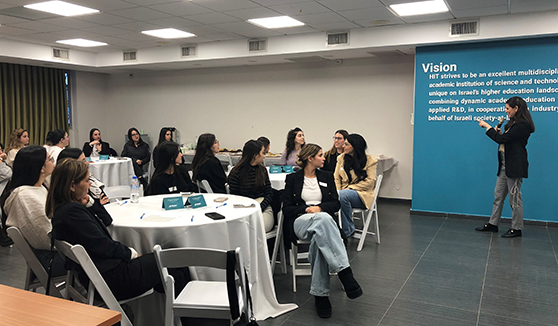More:
The Center for BioEngineering CBE
CBE is a hub for research and teaching at the interface of biology, engineering and physical sciences. It builds on Holon Institute of Technology (HIT) strengths in electronics and communication engineering, computer sciences, and computational and experimental systems, enabling fundamental scientific discoveries to be transitioned to applications in bio industry, recruiting researchers from various faculties in HIT. One of the main goals of the CBE is to develop new approaches to biomedical technology with applications to medicine and biology. CBE facilitates interdepartmental, multidisciplinary approaches to biomedical research to create an outstanding training environment for a new generation of students/leaders in Bioengineering.
The research in CBE includes: automatic detection of cerebral stroke, devise of efficient non-invasive brain computer interfaces for disabled patients, new diagnostic tools for breast mammography, early detection of Thyroid cancer, study of function and activation of platelets, structural mutations in platelets Integrin protein, Ultra-sensitive Nano electronic biochip, Magneto lithography, telemedicine, early detection and monitoring of dementia and medical data mining.
The Non-invasive Brain Computer Interface (BCI) Laboratory
The Noninvasive Brain Computer Interface (BCI) Laboratory was opened in October 2013 at the Engineering Faculty as part of the Center for Bio-engineering. The main research focus is the development of motor imagery-based BCIs for the treatment and rehabilitation of stroke patients. The work involves the development of novel multi-dimensional signal processing techniques (e.g., tensor factorization and decomposition) and BCI-based paradigms. Various psychophysical and physiological data are used to noninvasively decode neural correlates (EEG and MEG data) of 2D and 3D executed and imagined hand movements. Other fields of research are the detection of motion primitives using various novel experimental paradigms (e.g., the point-of-no-return) and kinematic analysis methods.
The Noninvasive Brain Computer Interface (BCI) Laboratory was opened in October 2013 at the Engineering Faculty as part of the Center for Bio-engineering. The main research focus is the development of motor imagery-based BCIs for the treatment and rehabilitation of stroke patients. The work involves the development of novel multi-dimensional signal processing techniques (e.g., tensor factorization and decomposition) and BCI-based paradigms. Various psychophysical and physiological data are used to noninvasively decode neural correlates (EEG and MEG data) of 2D and 3D executed and imagined hand movements. Other fields of research are the detection of motion primitives using various novel experimental paradigms (e.g., the point-of-no-return) and kinematic analysis methods.
The staff includes Dr. Ronen Sosnik, a neurologist and the head of the lab, Dr. Refael Barkan, head of the research, development and external relations authority and a research assistant. The lab has widespread collaborations with Israeli and non-Israeli research groups and medical centers, including the Wolfson Medical Center, Holon, and the Assaf Harofeh Medical Center, Rishon Le Zion.
The lab facilities include an 80-channel EEG system, an eye tracker, a robotic arm, a physiological recording system, a digitizing tablet and a Kinect. Various off-the-shelf (e.g., Matlab®, Microsoft Visual Studio and Biopac Acknowledge) and custom software are used to develop and test the experimental paradigms and analyze the data.
- News & Events



